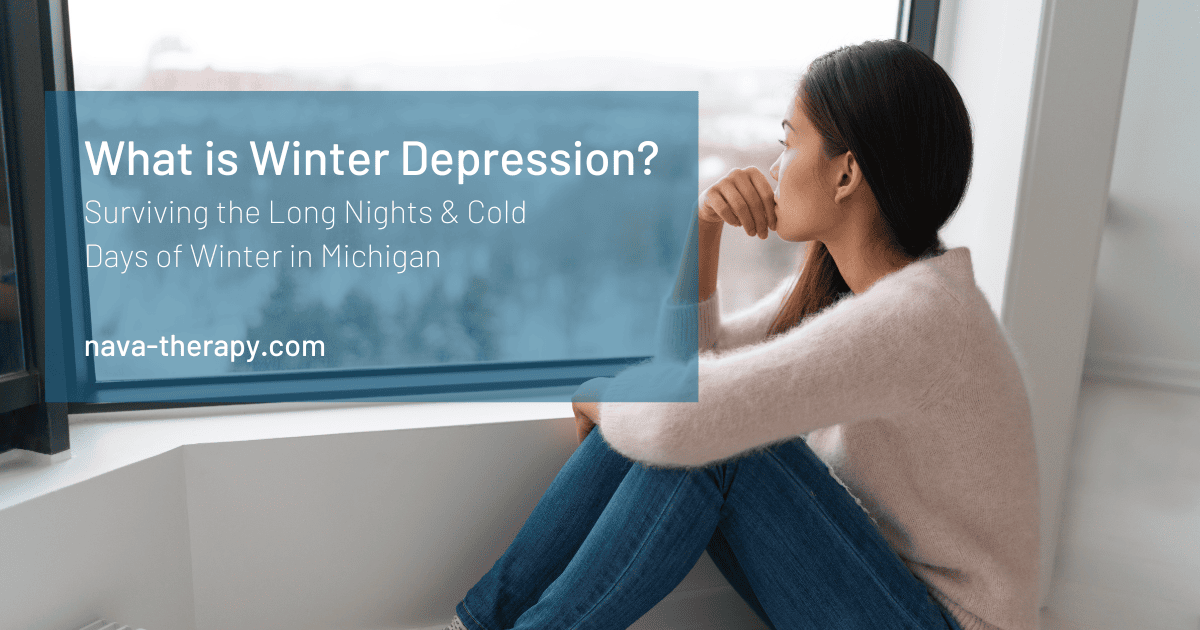Winter in Michigan is both beautiful and challenging. With snowy landscapes, wind chills, and the inevitable cold weather, many residents find themselves feeling the effects of seasonal depression, often referred to as winter depression or Seasonal Affective Disorder (SAD). Various weather advisories and warnings, such as winter storm alerts, are issued during the winter months to keep the public informed about potential hazardous and cold weather conditions. This article explores the nature of winter depression, why it happens, and how to survive the long, cold nights and short days in the Michigan winter.
We’ll also discuss practical strategies for embracing the winter months, including ideas for outdoor activities, tips for staying warm, and ways to protect your mental health during the coldest months of the year.

Why Michigan Winters and Extreme Cold Can Feel Overwhelming
Why Michigan Winters and Extreme Cold Can Feel Overwhelming
Michigan’s winters are no joke. From Detroit to north Ann Arbor, the Upper Peninsula, and beyond, the state experiences some of the most extreme winter weather advisory conditions in the Midwest. Factors like the Great Lakes contribute to more snow and biting wind chills. Freezing rain, winter storms, and subzero temperatures can transform everyday tasks into a significant inconvenience.
But why do Michigan winters feel so intense? The answer lies in the state’s unique climate:
- The Great Lakes EffectThe Great Lakes act as a massive heat sink in the summer, but in the winter months, they produce the infamous lake-effect snow. This phenomenon occurs when cold air moves across the warmer lake waters, picking up moisture and creating heavy snowfall, especially in areas like Grand Rapids and the south shore of Lake Michigan.
- Short Days and Long NightsIn late October, daylight hours start to dwindle significantly. By December, Michiganders experience some of the shortest days of the year, with only about 9 hours of sunlight per day. Less sunlight can disrupt your circadian rhythm and decrease serotonin levels, leading to feelings of fatigue, sadness, and winter depression.
- Extreme Cold and WindWith temperatures frequently dropping below freezing and wind chills making it feel even colder, the region is notorious for the coldest temperatures that can sap your energy and motivation.

What is Winter Depression?
What is Winter Depression?
Winter depression, or Seasonal Affective Disorder (SAD), is a type of depression that occurs during the winter months when daylight hours are shorter. Symptoms often begin in the fall and can persist until spring, although they may peak during the darkest days of January and February. Common symptoms include:
Persistent low mood
Fatigue, even after sleeping well
Difficulty concentrating
Increased appetite, particularly for carbs
Loss of interest in hobbies or other activities
Social withdrawal
Early on, it’s important to note that SAD is more than just the “winter blues.” It’s a clinically recognized condition that may require treatment, such as light therapy, counseling, or medication.

How to Combat Winter Depression in Michigan
How to Combat Winter Depression in Michigan
Living in a state with harsh winters doesn’t mean you have to surrender to the gloom. Here are practical steps to help you protect your mental and physical health:
1. Embrace Outdoor Activities

2. Dress for the Weather
A thermal hat to retain heat
A thick scarf to protect your neck
Waterproof boots to keep your feet dry
Gloves or mittens to shield your hands from freezing temperatures
When walking or engaging in outdoor activities, ensure your head, hands, and feet are well-protected to minimize heat loss.

3. Seek Warmth Indoors
Stay indoors as much as possible when the temperatures dip to extreme cold. Create a cozy environment with blankets, warm lighting, and hot drinks. Incorporating regular exercise into your routine can also boost endorphins, even if it’s just a quick workout in the middle of your living room.

4. Stay Connected and Social
Isolation can worsen winter depression, so prioritize social connections. Whether it’s meeting a friend for coffee in Detroit, joining a community event, or attending a class at a university or a local university, staying engaged can make a significant difference.

5. Use Light Therapy
Since Michigan’s winter months are notoriously dark, light therapy has become a widely recommended treatment for combating the effects of reduced sunlight. It’s particularly effective for individuals experiencing Seasonal Affective Disorder (SAD), which is closely linked to diminished exposure to natural light during winter. Research shows that light therapy can help regulate mood, improve energy levels, and restore normal sleep patterns.
Light therapy involves exposure to a specially designed light box that mimics natural sunlight. These devices emit bright light, typically at 10,000 lux, which is about 20 times brighter than ordinary indoor lighting. The bright light helps stimulate the brain’s hypothalamus, which regulates circadian rhythms, serotonin levels, and melatonin production.

According to a study published in American Family Physician, light therapy is most effective when used early in the day, ideally within the first half an hour of waking. Sitting near a light box for 20–30 minutes each morning can help reset your internal clock, making it easier to wake up, feel alert during the day, and fall asleep at night.
Improved Mood: Clinical trials have consistently shown that light therapy can significantly reduce depressive symptoms in individuals with SAD. A 2018 review in Psychiatry Research found that up to 80% of patients with SAD experience a noticeable improvement in mood after consistent light therapy.
Increased Energy: Lack of sunlight during winter months can cause lethargy and fatigue, even after a full night’s sleep. Light therapy helps counteract this by boosting serotonin levels and improving overall energy.
Better Sleep Patterns: With fewer daylight hours, your body may produce excessive melatonin, a hormone that promotes sleep. Light therapy helps regulate melatonin production, ensuring you feel more awake during the day and can fall asleep more naturally at night.
Reduced Anxiety: For some people, SAD also includes increased anxiety. Studies have shown that exposure to bright light reduces feelings of tension and restlessness, offering a calming effect.
Light therapy is considered safe for most people, but it’s essential to use it correctly to avoid potential side effects like headaches or eye strain. If you have a medical condition such as bipolar disorder, or if you’re taking medications that increase light sensitivity, consult a healthcare provider before starting light therapy.
Many reputable brands offer FDA-approved light boxes that meet the necessary specifications for treating SAD. They are widely available online or at local Detroit, Ann Arbor, and Grand Rapids retailers. Nava Therapy can also help you select the right device for your needs.
By incorporating light therapy into your routine, you can bring a little sunshine into the darkest winter months and reclaim the energy and joy that Michigan’s long, snowy nights may have taken away.
Winter Activities to Keep Your Spirits Up
Winter Activities to Keep Your Spirits Up
Michigan’s winters are perfect for embracing seasonal traditions. Here are a few ideas to help you enjoy the season:
Ice Fishing: Head to one of the frozen lakes in the Upper Peninsula or south shore regions.
Skiing and Snowboarding: Resorts in northern Michigan offer slopes for all skill levels.
Snowmobiling: With hundreds of miles of trails, Michigan is a top destination for snowmobile enthusiasts.
Holiday Festivals: Celebrate the season at winter festivals in cities like Grand Rapids or Ann Arbor.
Building Snowmen: A simple and fun way to enjoy snowy days with family or friends.

Staying Safe During a Michigan Winter Storm
Staying Safe During a Michigan Winter Storm
Michigan winters can bring hazardous conditions like freezing rain, winter storms, snow, and icy roads. Here’s how to stay safe:
Monitor Weather Alerts: Pay attention to winter weather advisory updates to stay informed about upcoming conditions.
Dress Appropriately: Always wear weather-appropriate clothes, including multiple layers to retain warmth.
Drive Carefully: Be cautious on icy roads and avoid unnecessary travel during severe winter storms.
Prepare an Emergency Kit: Keep supplies like blankets, food, and water in your car in case of an unexpected event.

When to Seek Help for Winter Depression
When to Seek Help for Winter Depression
If you’ve tried coping strategies but still feel weighed down by winter depression, consider reaching out to a licensed therapist. At Nava Therapy, our team of compassionate professionals—like Nishani Jayawardena, Shelby McCliggott, and Dr. Silvia G. Leija—specialize in helping clients navigate the challenges of seasonal depression and other mental health concerns.
We offer tailored therapeutic approaches that can help you reclaim your energy and joy, even during the darkest days of the Michigan winter. Resources like talk therapy, cognitive behavioral therapy (CBT), and mindfulness practices can provide the tools you need to thrive.

Looking Ahead to Warmer Days
Looking Ahead to Warmer Days
Though the cold can feel endless, Michigan’s seasons remind us of the beauty of change. Before you know it, March will arrive with hints of spring, bringing warmer temperatures, longer days, and the chance to enjoy the sun and outdoor activities without bundling up in layers. Reflecting on winter's coziness and stillness can make summer's arrival even sweeter.
If you’re feeling overwhelmed, remember that help is available. At Nava Therapy, we’re here to support you through the ups and downs of Michigan’s seasonal climate, offering a warm, empathetic space to address your mental health needs.
Let us help you find warmth and light this winter. Contact Nava Therapy today to schedule your first session.

